
Pinckney Benton Stewart Pinchback was an American publisher, politician, and Union Army officer. Pinchback was governor of Louisiana and the second lieutenant governor. A Republican, Pinchback served as acting governor of Louisiana for 35 days from December 9, 1872 to January 13, 1873, during which ten acts of Legislature became law. He was one of the most prominent office holders during and following the Reconstruction era during the Reconstruction Era.
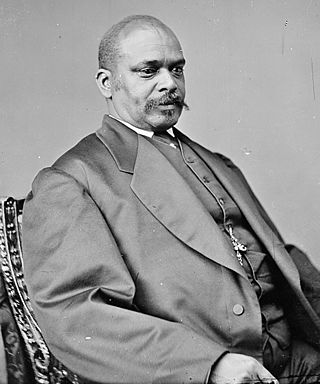
Oscar James Dunn served as Lieutenant Governor of Louisiana during the era of Reconstruction and was the first African American to act as governor of a U.S. state.
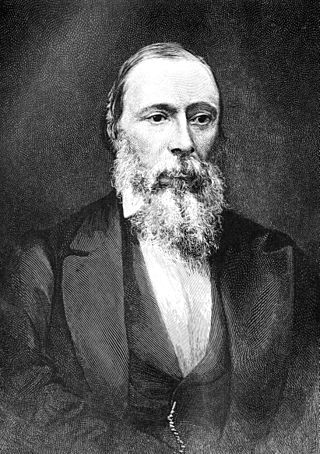
Jean-Charles Houzeau de Lehaie was a Belgian astronomer and journalist. A French speaker, he moved to New Orleans after getting in trouble for his politics in Belgium.
The Institute Catholique, also known as L'Institut Catholique des orphelins indigents and the Couvent School, was a Catholic school founded in New Orleans in 1840. It mainly served the non-orphan children of free people of color, who paid a modest tuition, and was founded with funds from Marie Couvent.

Henry Clay Warmoth was an American attorney and veteran Civil War officer in the Union Army who was elected governor and state representative of Louisiana. A Republican, he was 26 years old when elected as 23rd Governor of Louisiana, one of the youngest governors elected in United States history. He served during the early Reconstruction Era, from 1868 to 1872.
The Creoles of color are a historic ethnic group of Louisiana Creoles that developed in the former French and Spanish colonies of Louisiana, Mississippi, Alabama, and Northwestern Florida, in what is now the United States. French colonists in Louisiana first used the term "Creole" to refer to people born in the colony, rather than in Europe, thus drawing a distinction between Old-World Europeans and Africans from their descendants born in the New World. Today, these Creoles of color have assimilated into Black American culture, while some retain their distinct identity as a subset within the broader African American ethnic group.
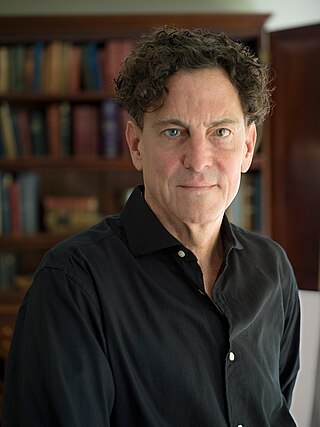
Edward Ball is an American author who has written multiple works on topics such as history and biography. He is best known for works that explore the complex past of his family, whose members were major rice planters and slaveholders in South Carolina for nearly 300 years. One of his more well known works is based around an African-American family, descended from one member of this family and an enslaved woman, whose members became successful artists and musicians in the Jazz Age.

Victor-Eugène McCarty was a Louisiana Creole singer, pianist, amateur actor, comedian, orator and writer. McCarty was a civil rights activist who held a seat in the Louisiana House of Representatives and was one of the first of several prominent free black composers. The musician frequently spoke at Creole meetings to advise them of their civil rights during the early phases of Reconstruction. He is best known for publishing Fleurs de salon: 2 Favorite Polkas in 1854 in New Orleans.

The New Orleans Tribune / La Tribune de la Nouvelle-Orléans was a newspaper serving the African-American community of New Orleans, Louisiana. It was the first Black daily newspaper in the United States.

Louisianian, also referred to as New Orleans Louisianian and The Louisianian was a semi-weekly newspaper published in New Orleans, Louisiana. The Louisianian was founded in 1870 by P. B. S. Pinchback (1837–1921), an African-American legislator who was elevated to governor of Louisiana in 1872. The paper's motto was “Republican at all times, and under all circumstances”. It was one of the few 19th-century African-American newspapers that sought both black and white readers.
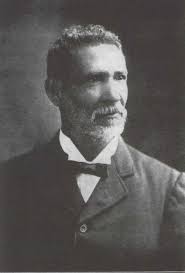
Rodolphe Lucien Desdunes was a Louisiana Creole civil rights activist, poet, historian, journalist, and customs officer primarily active in New Orleans, Louisiana.
Reverend Thomas W. Conway was assistant commissioner of the Freedmen Bureau in Alabama and Louisiana during the Reconstruction era that followed the American Civil War. Freedmen's Bureau activities in Louisiana began on June 13, 1865 when the Bureau's commissioner, Oliver O. Howard, appointed Chaplain Thomas W. Conway as the state's assistant commissioner. He published a report for that year, The Freedmen of Louisiana: Final Report of the Bureau of Free Labor, Department of the Gulf, to Major General Canby, Commanding (1865). Another seven assistant commissioners would later hold this office.
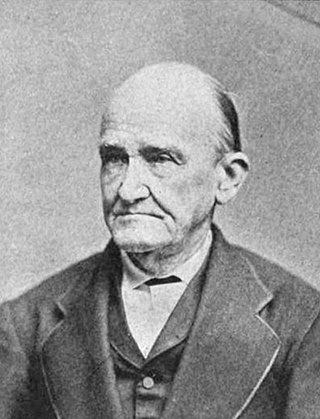
James Govan Taliaferro was a lawyer, newspaper publisher, and judge in Louisiana. As the secession movement grew he remained a staunch Unionist and was held for some time in a Confederate prison during the American Civil War.
Paul Trévigne was an American newspaperman and civil rights activist in New Orleans, Louisiana. He was editor of two black-owned newspapers, L'Union from 1862 until it closed in 1864, and then the New Orleans Tribune (1864-1870), the first black daily newspaper in the country.
Francis Ernest Dumas was a wealthy plantation owner and slaveholder of Louisiana. He was of African American and creole heritage and served as an officer in the Union Army during the American Civil War.

Jean-Louis Dolliole was an African-American architect in New Orleans, Louisiana, USA, during the 19th century. He was a free man of color who also worked as a cabinetmaker, home builder, contractor, planter and leader of the African-American community of New Orleans in the time of the Antebellum South. Dolloile is noted for the architectural design of several residential projects which continue in use as homes into the 21st century. The designs were early versions of the creole cottage that became a common style of homes in New Orleans and elsewhere in the southern United States. Dolliole was a leader in the early development of the Faubourg Tremé neighborhood of New Orleans.
Le Meschacébé was a French-language newspaper in Louisiana that also carried some English-language content and eventually became an English-language newspaper. The title of the newspaper comes from the Mississippi River, referred to as Le Meschacébé in French.
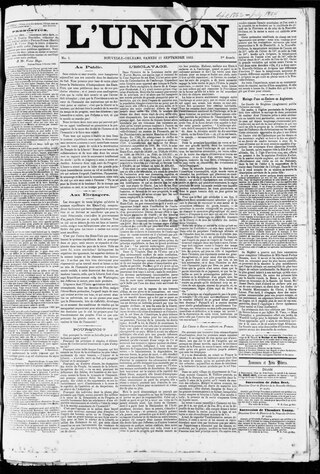
L'Union was the first African-American newspaper in the Southern United States. The newspaper was based in New Orleans, Louisiana, and was published from 1862 to 1864. Articles in L'Union were written in the French language, with the newspaper's primary readership being free people of color in the New Orleans area, especially in the faubourgs Marigny and Tremé.
Jean François Canonge lawyer, judge, slave owner, clerk, and politician. He was the judge who provided the deposition on the mistreatment of slaves by Delphine LaLaurie. Jean studied law with French American linguist and philosopher Peter Stephen Du Ponceau. He spoke French, Spanish, and Haitian Creole and functioned as an orator, linguist, and improviser for the Louisiana legislature as a clerk for over ten years. He translated Georgics into Haitian Creole and was a Grand Master Freemason. Records indicate Jean and his wife Amelie Mercier freed two slaves Joseph and Marcel. His son was the dramatist Louis Placide Canonge.

Louis Placide Canonge was a Creole journalist, politician, playwright, actor, librettist, and lyricist. His most celebrated play Le Comte De Carmagnola appeared in Paris for one hundred nights. He regularly contributed to New Orleans newspapers some included: L’Abeille, Louisiana Lorgnette, Le Propagateur Catholique, Le Courrier De La Louisiane, La Presse and many more. Canonge is known for participating in two infamous duels involving theater. Canonge translated Nojoque A Serious Question For A Continent into a French version entitled Nojoque Une Grave Question Pour Un Continent. The book violently features the use of the word negro and subjugates their community, it was written by Hinton Rowan Helper. Canonge uses the translation to voice his discontent with reconstruction and the status of the negro; in contrast, he wrote lyrics for Francois-Michel-Samuel Snaer a Creole of color, and a favorable eulogy for Louis Charles Roudanez a Creole of color who founded the nation's first daily Black newspaper, which was also bilingual.













